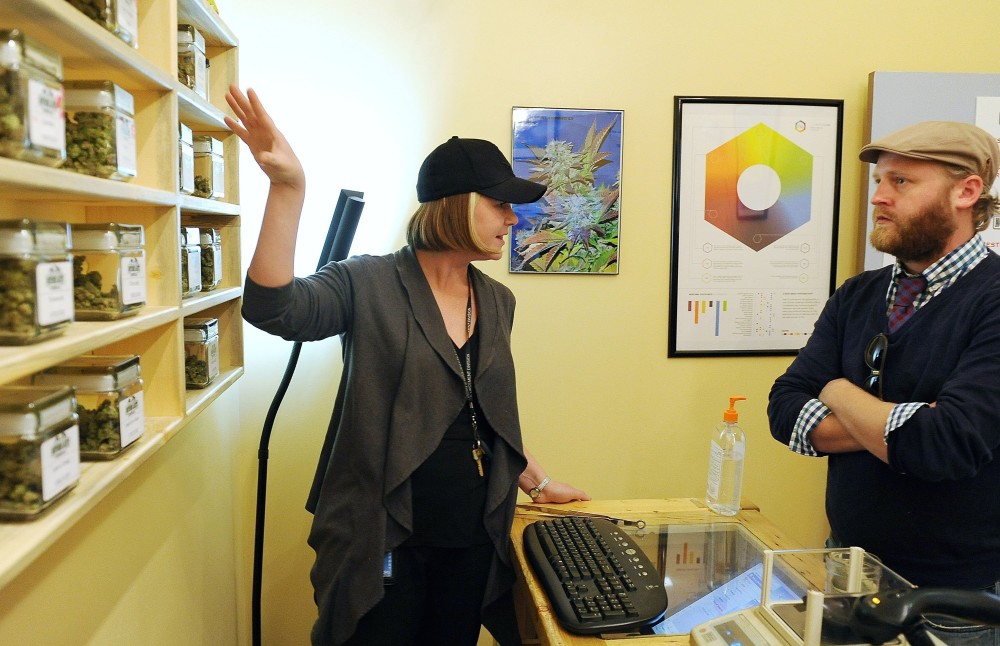COMMENTARY
By Thomas Maier
Newsday.
Big-time investors hoping to profit from America’s emerging business in legalized marijuana might see a bit of themselves in the historic example of Joseph P. Kennedy, the father of President John F. Kennedy.
Back in 1933, the Kennedy patriarch made sure his liquor firm would be the first to make millions as Prohibition’s decadelong ban on alcohol sales ended. He did so with a blend of politics, cash and timely maneuvers.
Today’s pot entrepreneurs, looking to cash in on the estimated $20 billion market in marijuana sales by 2020, may find from some striking then-and-now similarities in Kennedy’s experiences.
Just like pro-marijuana advocates have witnessed in recent years, Kennedy anticipated a change in America’s attitudes about alcohol.
Prohibition’s good intentions toward sobriety had backfired, creating more crime and bootlegging by the 1930s. While Kennedy already had earned a fortune on Wall Street and in Hollywood, he realized he could make some more money by selling liquor to an America tired of legal restrictions.
Well before Prohibition ended in December 1933, Kennedy set out a strategy to beat out his potential competition.
Kennedy began by offering alcohol for medical reasons, just like today’s pot entrepreneurs in states such as Colorado where medical marijuana was first sold before it was approved for recreational use.
Though he didn’t drink, Kennedy made sure in 1929 to get a “Prohibition Service” permit to transport liquor legally for personal use, roughly four cases (12 gallons) of sherry, and became part of a widening circle of distributors who provided alcohol to customers for solely “medicinal purposes.”
Similar to today’s pot entrepreneurs, who sometimes hire expensive lobbyists and publicity experts, or contribute to pro-marijuana candidates, Kennedy also learned how to influence public policy.
Unlike his conservative Wall Street friends, Kennedy supported New York Gov. Franklin D. Roosevelt, the winning 1932 Democratic Party candidate for president, rather than the GOP incumbent Herbert Hoover. On the question of alcohol liberalization, FDR was a “wet” who wanted to make booze legal, while Hoover was considered “dry” for defending Prohibition as a “noble” cause. With Roosevelt’s election, Kennedy knew Prohibition would soon be over and that his firm, Somerset Importers, was poised to take advantage.
Like today’s marijuana entrepreneurs looking for farms and warehouses to grow their carefully cultivated weed, Kennedy sought a guaranteed supply of top-grade alcohol. Because many U.S. distilleries had closed because of Prohibition, he orchestrated a deal to import British whiskey, gin and other liquor to America.
Before leaving for England, where he later served as U.S. ambassador, Kennedy gained the exclusive New England rights to sell “various brands of alcohol beverages” handled by the National Distillers Products Corp., the firm headed by fellow FDR campaign contributor Seton Porter. Prohibition had nearly killed Porter’s business. It crawled out of bankruptcy court protection by selling wine for religious services. Now that the Roosevelt team ruled Washington, both Kennedy and National Distillers expected to grow dramatically.
Exquisite timing also helped. In October 1933, two months before Prohibition ended, Kennedy secured the British liquor deal by traveling to London with FDR’s oldest son, Jimmy, on a trip that included a visit with Winston Churchill. Somerset saw its business in the United States soar, selling 150,000 cases of Scotch whisky in the first full year. “We have done surprisingly well with contracts,” Kennedy wrote his oldest son, Joe Jr. By the end of 1934, National Distillers, including its New England franchise run by Kennedy, declared that its net profits had quadrupled in a year.
Kennedy remained in the liquor business until 1946, when his son, John F. Kennedy, ran for Congress. Joe decided it was best politically to sell his firm. On his initial $118,000 investment, Kennedy “realized immense profits,” said biographer Richard J. Whalen, enough to be included in the trust fund that he established for his wife, Rose, and their children, including JFK.
For today’s budding millionaires in the booming marijuana market, Joe Kennedy’s historical example with alcohol is a lesson in how much money can be made when once criminal vices become legal. It’s not clear whether any entrepreneur investing in cannabis is as ambitious as Joe Kennedy. But maybe someday a future U.S. president will owe his or her backing to the marijuana industry.
___
ABOUT THE WRITER
Thomas Maier, a Newsday reporter, is the author of “When Lions Roar: The Churchills and the Kennedys.”














































































































































































































































































































































































